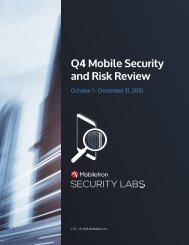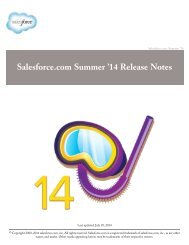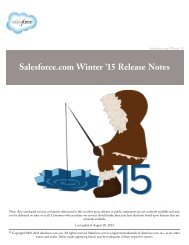salesforce_security_impl_guide
salesforce_security_impl_guide
salesforce_security_impl_guide
Create successful ePaper yourself
Turn your PDF publications into a flip-book with our unique Google optimized e-Paper software.
Securing and Sharing Data<br />
Managing Salesforce Classic Permissions<br />
Managing Salesforce Classic Permissions<br />
A mobile license is required for each user who will access the full version of the Salesforce Classic<br />
app. You allocate mobile licenses using the Mobile User checkbox on the user record. For<br />
organizations using Unlimited, Performance, and Developer Editions, <strong>salesforce</strong>.com provides a<br />
mobile license for each Salesforce license and the Mobile User checkbox is enabled by default<br />
for all users. Organizations using Professional or Enterprise Editions must purchase mobile licenses<br />
separately and allocate them manually.<br />
Note: The Mobile User checkbox is disabled by default for new Performance Edition<br />
users.<br />
To prevent users from activating the full version of Salesforce Classic on their mobile devices before<br />
you’re ready to deploy the app, disable the Mobile User checkbox for all your users.<br />
Any Salesforce user who doesn't have a mobile license can download a free, restricted version of<br />
Salesforce Classic. Starting with Summer ‘13, the free version of Salesforce Classic is disabled by<br />
default in all new organizations. You can enable it to give users access to Salesforce on their mobile<br />
devices.<br />
To enable the free version of Salesforce Classic:<br />
1. From Setup, click Mobile Administration > Salesforce Classic > Settings.<br />
2. Click Edit.<br />
3. Select Enable Mobile Lite .<br />
4. Click Save.<br />
EDITIONS<br />
Free version available in: All<br />
editions except<br />
Database.com<br />
Full version available in:<br />
Performance, Unlimited,<br />
and Developer Editions, and<br />
for an additional cost in:<br />
Professional and Enterprise<br />
Editions<br />
USER PERMISSIONS<br />
To view Salesforce Classic<br />
configurations:<br />
• “View Setup and<br />
Configuration”<br />
To create, change, or delete<br />
Salesforce Classic<br />
configurations:<br />
• “Manage Mobile<br />
Configurations”<br />
Organization-Wide Sharing Defaults Overview<br />
Organization-wide sharing settings specify the default level of access to records and can be set<br />
separately for accounts (including assets and contracts), activities, contacts, campaigns, cases, leads,<br />
opportunities, calendars, price books, and custom objects.<br />
For most objects, organization-wide sharing settings can be set to Private, Public Read Only, or<br />
Public Read/Write. In environments where the organization-wide sharing setting for an object is<br />
Private or Public Read Only, an administrator can grant users additional access to records by setting<br />
up a role hierarchy or defining sharing rules. However, sharing rules can only be used to grant<br />
additional access—they cannot be used to restrict access to records beyond what was originally<br />
specified with the organization-wide sharing defaults.<br />
EDITIONS<br />
Available in: Professional,<br />
Enterprise, Performance,<br />
Unlimited, Developer, and<br />
Database.com Editions.<br />
Customer Portal is not<br />
available in Database.com<br />
Important: If your organization uses a Customer Portal, before you enable contacts to access<br />
the portal, set the organization-wide sharing defaults on accounts, contacts, contracts, assets,<br />
and cases to Private. This ensures that by default your customers can view only their own<br />
data. You can still grant your Salesforce users Public Read/Write access by creating sharing<br />
rules in which all internal users share with all internal users.<br />
By default, Salesforce uses hierarchies, like the role or territory hierarchy, to automatically grant access of records to users above the<br />
record owner in the hierarchy.<br />
45






